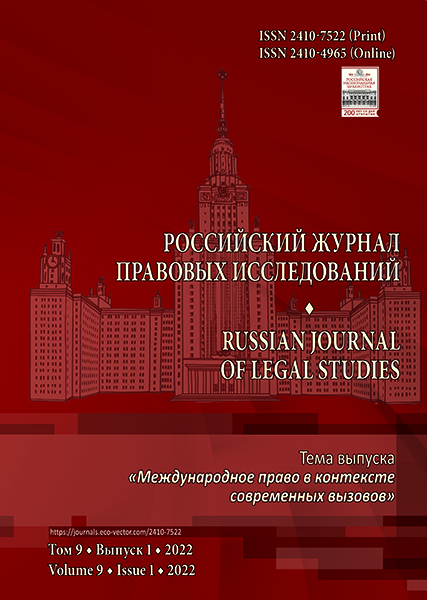Предварительные возражения в международном судопроизводстве как элемент международно-правовой политики государства
- Авторы: Магомедова О.С.1
-
Учреждения:
- Московский государственный институт международных отношений (Университет) МИД России
- Выпуск: Том 9, № 1 (2022)
- Страницы: 23-32
- Раздел: Актуальная тема
- Статья получена: 28.12.2021
- Статья одобрена: 01.02.2022
- Статья опубликована: 12.04.2022
- URL: https://journals.eco-vector.com/2410-7522/article/view/91156
- DOI: https://doi.org/10.17816/RJLS91156
- ID: 91156
Цитировать
Полный текст
Аннотация
В современной международно-правовой доктрине предварительные возражения рассматриваются как процессуальные средства ограничения рассмотрения международного спора в судебном порядке. На таком подходе основаны работы по классификации видов предварительных возражений. Однако предварительные возражения могут рассматриваться не только автономно в рамках конкретного судебного дела, но как часть международно-правовой политики государств. Согласно концепции международно-правовой политики государства каждое государство участвует в развитии международного права, следуя особой стратегии по защите и продвижению своих международно-правовых позиций по различным вопросам. В процессе согласования воль по определению содержания современного международного права каждое государство стремится выстроить свою стратегию отстаивания своей международно-правовой позиции таким образом, чтобы убедить международное сообщество в правомерности и необходимости предлагаемого взгляда на определенный международный вопрос с минимальными уступками другим государствам.
Международно-правовая политика проводится на каждом этапе жизненного цикла международно-правовых норм от нормообразования до толкования, применения и доказывания на их основе позиций в процессе урегулирования международных споров. Предварительные возражения могут рассматриваться как элементы такой международно-правовой политики наравне с другими шагами и заявляемыми позициями государства в международной сфере. С точки зрения концепции международно-правовой политики государства в статье рассматривается гипотеза о взаимосвязи между заявлением предварительных возражений и исходом дела.
Автор приходит к выводам, что предварительные возражения действительно отражают отношение государства к рассматриваемому международному спору или судебному процессу в целом, однако они не являются решающим фактором для прогнозирования поведения государства в судебном процессе, а главное — в отношении обязательного исполнения судебного решения. Обзор практики Международного Суда ООН показывает, что заявление государством предварительных возражений не всегда свидетельствует о слабости его международно-правовых аргументов для отстаивания позиции в суде и не предопределяет неисполнения международного судебного решения. Однако исследование предварительных возражений как части международно-правовой политики государства по конкретному вопросу позволяет расширить понимание позиции государства, представляемой в споре.
Полный текст
Об авторах
Ольга Сергеевна Магомедова
Московский государственный институт международных отношений (Университет) МИД России
Автор, ответственный за переписку.
Email: olga.magomedova.96@mail.ru
ORCID iD: 0000-0003-0593-3101
аспирант кафедры международного права
Россия, МоскваСписок литературы
- Пунжин С.М. Процессуальное право Международного Суда: предварительные возражения (общая часть) // Международное правосудие. 2011. № 1. С. 46–60.
- Rosenne Sh. The Law and Practice of the International Court, 1920–2005. Leiden – Boston: Martinus Nijhoff Publishers. Vol. I. 4th Ed. 2006. 1892 p.
- Hwang M.S.C., Cheng L.S. The Chimera of Admissibility in International Arbitration – And Why We Need to Stop Chasing It in Hwang M.S.C Selected Essays on Dispute Resolution. Singapore: Singapore International Arbitration Centre. 896 p.
- Tomuschat C. Article 36 in A Zimmerman et al (eds). The Statute of the International Court of Justice: A Commentary. Oxford: Oxford University Press. 2nd Ed. 2012. 2016 p.
- Ndiaye T.M. Admissibility before the International Courts and Tribunals // Journal of Law and Judicial System. 2018. Vol. 1. № 2. P. 21–48.
- Crawford J. Brownlie’s Principles of Public International Law. Oxford: Oxford University Press. 8th Ed. 2012. 888 p.
- de Lacharrière G.L. La politique juridique extérieure. Paris: Economica. 1983. 229 p.
- Тункин Г.И. Теория международного права / под общей ред. проф. Л.Н. Шестакова. М.: Издательство «Зерцало», 2006. 416 с.
- Virally M. Réflexions sur la politique juridique des Etats in Virally M. (ed.) Guy Ladreit de Lacharrière et la politique juridique extérieure de la France. Paris: Masson, 1989. P. 394–411.
- de Lacharrière G.L. L’influence de l’inégalité de développement des Etats sur le droit international // RCADI. 1973. Vol. II. № 139. P. 22–268.
- Hughes D. How States Persuade: An Account of International Legal Argument Upon the Use of Force // Georgetown Journal of International Law. 2019. Vol. 50. № 4. P. 839–946.
- Ratner S., Johnstone I. Talking International Law: legal argumentation outside the courtroom. Oxford: Oxford University Press. 2021. 376 p.
- Pellet A. Le Sage, le Prince et le Savant (A propos de ‘La politique juridique extérieure’ de Guy de Lacharrière) // Journal du Droit International. 1985. № 2. P. 407–414.
- Odermatt J. Patterns of avoidance: Political questions before international courts // International Journal of Law in Context. 2018. Vol. 14. № 2. P. 221–236.
- Гальперин М. Политизация права или легализация политики? О justiciability и доктрине «политического вопроса» на примере международного правосудия // Международное правосудие. 2020. № 4 (36). С. 45–58.
- Lauterpacht H. Function of International Law. Oxford: Oxford University Press. 2011. 512 p.
- Tama N.M. Nicaragua v. United States: The Power of the International Court of Justice to Indicate Interim Measures in Political Disputes // Penn State International Law Review. 1985. Vol. 4. № 1. P. 65–87.
- Scott G.L., Carr C.L. The ICJ and Compulsory Jurisdiction: The Case for Closing the Clause // The American Journal of International Law. 1987. Vol. 81. № 1. P. 57–76.
- Ginsburg T., McAdams R.H. Adjudicating in Anarchy: An Expressive Theory of International Dispute Resolution // William and Mary Law Review. 2004. Vol. 45. № 4. P. 1229–1339.
- Рачков И. В. Решения Международного Суда по делу о храме Преа Вихеар / Международное Правосудие. 2015. № 4 (16). С. 24–34.
Дополнительные файлы








